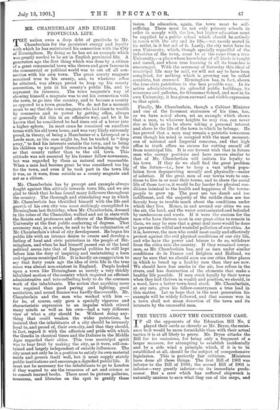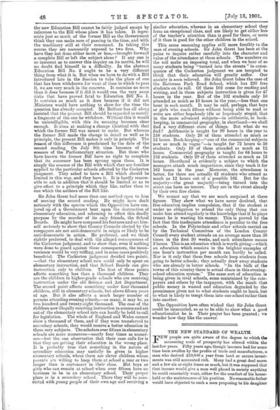THE TRUTH ABOUT THE COCKERTON CASE.
IF all the opponents of the Education Bill No. 2 played their cards as cleverly as Mr. Bryce, the resist- ance to it would be more formidable than with their actual tactics it is at all likely to prove. Mr. Bryce attacks the Bill for its omissions, for being only a fragment of a larger measure, for attempting to establish incidentally and by a side wind a principle which, if it is to be established at all, should be the subject of comprehensive legislation. This is perfectly fair criticism. Ministers have done all these things. The first Bill of 1901 was inferior to the Bill of 1896; the second Bill of 1901 is inferior—very greatly inferior—to its immediate prede- cessor. But a crew which has suffered shipwreck is naturally anxious to save what they can of the cargo, and bbe new Education Bill cannot be fairly, judged except by reference to the Bill whose place it has taken. It repre- sents just so much of the former Bill as the Government think they can make sure of passing in the time, and with the machinery still at their command. In taking this course they are necessarily exposed to two fires. Why have they not done either more or less,—brought forward a complete Bill or left the subject alone ? If any one is so innocent as to answer this inquiry on its merits, he will no doubt find, himself in a difficulty. In the abstract Education Bill No. 2 ought to be a. very different thing from what it is. But when we have to do with a Bill introduced late in the Session to take the place of one that has been withdrawn for want of time in which to pass it, we are very much in the concrete. It contains no more than it does because if it did. it would. run the very same risks that have proved fatal to Education Bill No. 1. it contains as much as it does because if it did not Ministers would have nothing to show for the time the question has already occupied. Mr. Balfour has all along insisted that the present Bill should be regarded as merely a fragment of the one he withdrew. Without this it would be unintelligible, with this its meaning becomes clear enough. It aims at making a e identical with that which the former Bill was meant to make. But whereas the former Bill made the change in detail as well as in principle, the present Bill makes it only in principle. The reason of this difference is proclaimed. by the date of the second reading. On July 8th time becomes of the essence of the Parliamentary situation. But those who have known the former Bill have no right to complain that its successor has been sprung upon them. it is simply the essence of the Bill with which they are familiar applied to the particular schools affected by the Cockerton judgment. They asked to have a Bill which should be limited in this way, and. they have it. It is hardly reason- able to ask in addition that it should be limited. so as to give effect to a principle which they like, rather than to one which the authors of the Bill like.
Sir John Gorst had more than one method open to him of moving the second reading. He might have dealt seriously with the spectre which the Opposition have con- jured up of a Government bent upon the destruction of elementary education, and scheming to effect this deadly purpose by the murder of its only friends, the School _Boards. He might have composed his features and set him- self seriously to show that County Councils elected by the ratepayers are not anti-democratic in origin or likely to be anti-democratic in action. He preferred, and we think rightly preferred, to deal with the alleged consequences of the Cockerton judgment, and to show that, even if nothing were done to guard. against these consequences, the incon- venience would be very trifling, and in some cases positively beneficial. The Cockerton judgment decided two points, —that the elementary school rate could only be spent on elementary instruction, and that School Boards can give instruction only to children. The first of these points affects something less than a thousand. children. They are the children in higher-grade schools who are receiving instruction under the old Science and Art Department. The second point affects something under four thousand children, still in elementary schools, but above fifteen years of age. But it also affects a much larger number of persons attending evening schools,—as many, it may be, as two hundred and twenty-eight thousand. The case of the children now illegally receiving instruction in science and art out of the elementary school rate can hardly be held. to call for legislation. The whole of England and Wales cannot show a thousand of them, and if they were transferred to secondary schools, they would receive a better education in these very subjects. The scholars over fifteen in elementary schools are more numerous—nearly four times as numer- ous—but the one observation that their case calls for is that they are getting their education in the wrong place. It is probably true that something in the nature of secondary education may usefully be given in higher elementary schools, where there are clever children whose parents are willing to keep them at school a year or two longer than is customary in their class. But boys or girls who can remain at school when over fifteen have no business to be in an elementary school. Their proper place is in a secondary school. There they will be asso- ciated with young people of their own age and receiving a similar education, whereas iu an elementary school they form an exceptional class, and. are likely to get either less of the teacher's attention than is good for them, or more of it than is good for the other children in the schobl.
This same reasoning applies still more forcibly to the case of evening schools. Sir John Gorst has been at the pains to inquire rather carefully into the character and. value of the attendance at these schools. The numbers on the roll make an imposing total, and when we hear of so many students being "turned into the streets" in conse- quence of the Cockerton judgment we are tempted to think that their education will greatly suffer. Our anxiety is soon relieved. Sir John Gorst takes the case of the Battersea Park Road School, which has 230 free students on its roll. Of these 102 come for reading and writing, and in these subjects instruction is given for 47 hours in the year. But of the 102 students only -10 attended as much 313 10 hours in the year,—less than one hour in each month. It may be said, perhaps, that boys or girls who reach fifteen without being able to read or write are either hopelessly idle or hopelessly stupid, that in the more advanced subjects—in arithmetic, in book- keeping, in commercial geography, in shorthand—we shall find a very different state of things. But what do we find.? Arithmetic is taught for 99 hours in the year to 158 students. Only 26 of them attended as much as 12 hours. Book-keeping—" one of the commercial subjects now so much in vogue "—is taught for 72 hours to 38 students. Only 10 of them attended. as much as 12 hours. Commercial geography is taught for 64 hours to 152 students. Only 29 of them attended as much as 12 hours. Shorthand is evidently a subject to which the managers attach much importance, since they teach it for 162 hours in the year. Moreover, the attendance is better, for there are actually 42 students who attend. as much as 12 hours out of a possible 162. But for the majority—the great majority—being turned into the street can have no terrors. They are in the street already by their own free choice.
We cannot say that we are much surprised at these figures. They show what we have never doubted, that free education implies compulsion, that if the' student is under no obligation to attend the only thing that can make him attend regularly is the knowledge that if he plays truant he is wasting his money. This is proved by the fact that this inadequate attendance is peculiar to the free schools. In the Polytechnic and other schools carried. on by the Te bnical Committee of the London County Council every student attends on an average more than 30 times in the first 30 weeks, and each attendance means 2 hours. This is an education which is worth giving—which an education which consists in the brighter examples of one hour's instruction per month can hardly be called. Nor is it only that these free schools keep students from going to better schools ; they actually draw away students who are already in better schools. "In the bulk of the towns of this country there is actual chaos in this evening- school education system." The same sort of education is being given in rival schools, some maintained by the rate- payers and others by the taxpayers, with the result that public money is wasted and. education degraded. by the prominence (riven not to what students ought to learn, but to what is nicely to tempt them into one school rather than into another.
The Opposition have often wished that Sir ,lohn Gorst could be unmuzzled, so as to be able to show what a good educationalist he is. Their prayer has been granted ; we wonder how they like the answer.







































 Previous page
Previous page